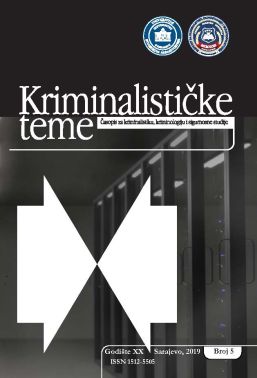CYBER KRIMINAL KAO MODERNA SIGURNOSNA PRIJETNJA U BOSNI I HERCEGOVINI
CYBERCRIME AS A MODERN SECURITY THREAT IN BOSNIA AND HERZEGOVINA
Author(s): Amina SmailhodžićSubject(s): Criminal Law, Security and defense, Criminology, Social Informatics, ICT Information and Communications Technologies
Published by: Fakultet za kriminalistiku, kriminologiju i sigurnosne studije Univerziteta u Sarajevu
Keywords: cyber crime; security; social networks; electronic commerce;
Summary/Abstract: Reason for writing and research problem (s): By developing information technology, cybercrime exists as an intolerable aspect of violation of law and abuse. It has specific characteristics that distinguish it from other criminal delinquencies and is a form of crime that has no boundaries and as such is difficult to detect. The consequences of cybercrime are great for individuals as well as for the state. Cybercrime has taken a global dimension and broadly destroys business systems by creating enormous financial costs. Cybercrime illustrates the criminal activity committed by using computers, networks and computer systems. A large number of cybercrime incidents are related to bank fraud and the abuse of identity on social networks. Aims of the paper (scientific and/or social): The theme of this paper is being studied from a scientific and social point of view. The facts related to the cybercrime problem in Bosnia and Herzegovina need to be explained. The scientific aim of the research should show the appropriate level of scientific knowledge about cybercrime in Bosnia and Herzegovina. The Social Objective of Research relates to information on cybercrime as a modern security threat in Bosnia and Herzegovina, respectively that citizens of Bosnia and Herzegovina, and beyond, are introduced to the characteristics and the presence of cybercrime in Bosnia and Herzegovina. Methodology/Design: This research analyzes cybercrime as a modern security threat in Bosnia and Herzegovina. The paradigm to which research belongs is positivism. By using the method of analyzing the content of documents, a review of accessible cybercrime literature was performed. The hypothetical-deductive method, the inductive, the analysis method, the synthesis, the abstraction method, the descriptive method and the statistical method are represented in the research. Research/Paper limitation: Cybercrime is complex and covers various criminal activities that involve attacks on computers, computer systems, and data. The research will be centered on the territory of Bosnia and Herzegovina. Results/Findings: Research results should justify the scientific and social significance of research. The results of scientific research have shown the seriousness of the cybercrime consequences. The Internet is endangered on a daily basis through social networks, web sites, and e-commerce. General Conclusion: Cybercrime means a negative social phenomenon of the contemporary age. Cybercrime research in Bosnia and Herzegovina needs to be analyzed in continuity. Cybercrime is not national, geographic, and time constrained. Due to the dynamic development of information technology, it is imperative to constantly observe the changes that are taking place in order to successfully counter the challenges of cybercrime. Prevention should be reflected in the take-up of activities in order to overcome the failures of abusing computer data and systems. Prevention also implies undertaking activities and preparing staff plans for the technology system to prevent unauthorized access to the system. Successful cybercrime is possible if the entire international community is involved.
Journal: Kriminalističke teme – Časopis za kriminalistiku, kriminologiju i sigurnosne studije
- Issue Year: XIX/2019
- Issue No: 5
- Page Range: 129-157
- Page Count: 29
- Language: Bosnian, Croatian, Serbian

